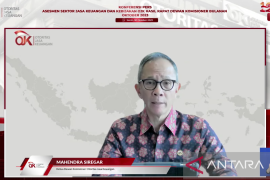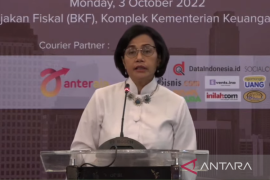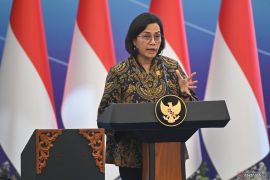Finance Minister Sri Mulyani Indrawati said she would encourage the deepening and stability of the financial sector, in order to create sustainable economic development.
"If a country has a deep and stable financial sector and financial market, they will be better able to carry out sustainable development," she said during an online discussion on Leading Indonesian Financial Literacy here on Tuesday.
Indrawati stated that the financial sector should be deepened so that the country's resilience is not easily affected by global and regional shocks. Therefore, development and the country's economy would remain more stable.
She noted that sometimes the domestic economic development of a country will be affected when there is a change in policy or turmoil in another country.
Related news: Financial services sector sustain stability in 2021 first-semester
Meanwhile, further deepening, she said, must also be done, given that 70 percent of the financial sector is dominated by the banking sector, which during the COVID-19 pandemic crisis displayed a very vulnerable resilience.
Amidst the COVID-19 pandemic, many banking sectors recorded negative credit growth, as they were unable to extend credit. This situation will certainly make economic recovery more difficult.
The Minister of Finance stated that the deepening of the financial sector can be done by expanding investors, especially at the retail level, as the number of new investors in the country remains relatively small.
She gave an example of offering retail Government Bonds (SUN) instruments for Retail Savings Bonds (SBR) series SBR010, which only had 9,068 new investors.
"When compared to the number of Indonesians or Indonesian workers, this figure is still small,” she said.
Related news: Vaccination for financial workers to boost industry's confidence
Hence, the expansion of new investors can only be realized if the government is aggressively educating the public, in order to increase literacy and inclusion in the financial sector.
The National Financial Literacy and Inclusion Survey (SNLIK), conducted by the Financial Services Authority (OJK) in 2019, found that the financial literacy index reached 38.03 percent and the financial inclusion index 76.19 percent.
Meanwhile, the government is targeting financial inclusion to reach 90 percent by 2024, as the finance minister encourages an increase in literacy. Then, people can understand and protect their assets.
"We still have the opportunity to continue to encourage financial literacy and market deepening by continuing to expand the investor base," the minister said.
Related news: Financial sector must recover intermediary function: minister
Related news: Beware of high interest rate instruments: OJK
Translator: Astrid Faidlatul Habibah, Katr
Editor: Fardah Assegaf
Copyright © ANTARA 2021












